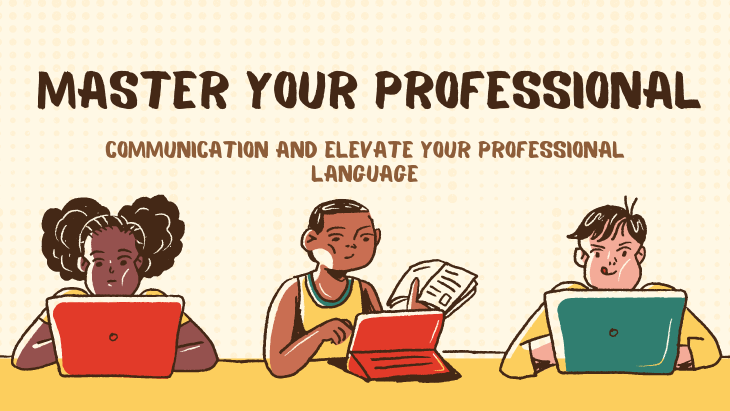Content Discussed:
- Why Professional Communication Matters
- Benefits of Using Professional Language
- Examples of Basic Communication vs. Professional Communication
- Practical Tips for Enhancing Professional Communication
- Basic Words vs. Professional Alternatives
Are you ready to take your communication skills to the next level? In today’s fast-paced world, the ability to convey your thoughts and ideas effectively is more important than ever. Whether you’re a job seeker looking to impress recruiters or a seasoned professional aiming for career advancement, mastering professional communication can be the key to unlocking new opportunities and achieving your goals. In this blog, we’ll explore the importance of professional language and provide practical tips for incorporating it into your everyday interactions.
1.Why Professional Communication Matters: Clear and professional communication is essential for building trust, fostering collaboration, and achieving goals. Whether you’re writing emails, participating in meetings, or networking with colleagues, how you express yourself can significantly impact your credibility and success. Employers value candidates who can articulate their ideas clearly and confidently, making professional communication a valuable skill in today’s job market.
2. Benefits of Using Professional Language] Using professional language not only enhances clarity and precision but also demonstrates competence and professionalism. By choosing the right words, you can convey confidence, authority, and attention to detail, making a lasting impression on your audience.
3.Examples of Basic Communication vs. Professional Communication
Basic Conversation 1: Asking for Help
Person A: “Hey, can you help me with this?”
Person B: “Sure, what do you need?”
Professional Conversation 1: Requesting Assistance
Person A: “Excuse me, could you please assist me with this task?”
Person B: “Of course, I’d be happy to help. What specifically do you require assistance with?”
Basic Conversation 2: Scheduling a Meeting
Person A: “Hey, can we have meeting tomorrow?”
Person B: “Sure, what time works for you?”
Professional Conversation 2:
Person A: “Hello, could we schedule a meeting for tomorrow?” Person B: “Of course, what time would be convenient for you?
4. Practical Tips for Enhancing Professional Communication] To enhance your professional communication skills:
- Expand your vocabulary by learning synonyms and professional terms.
- Practice active listening and ask clarifying questions when needed.
- Pay attention to tone, body language, and nonverbal cues to convey confidence and professionalism.
5. Basic Words vs. Professional Alternatives
Let’s dive into some common words and their professional counterparts:
| Basic Sentence | Professional Sentence |
|---|---|
| Can you help me with this? | Could you please assist me with this task? |
| I like your idea. | I appreciate your innovative idea. |
| I’ll try to finish it by today. | I’ll make every effort to complete it by today. |
| I’ll do it today. | I’ll ensure it’s completed today. |
| I know this. | I’m familiar with this. |
| Okay. | Understood, or Agreed. |
| I want your assistance. | I require your assistance. |
| Let’s talk about it. | Let’s discuss this matter. |
| Can I ask you a question? | May I inquire about something? |
| I don’t agree with that. | I have a different perspective on this matter. |
| I don’t need that. | It’s unnecessary for our current objectives. |
| I don’t want to talk about this. | I prefer not to discuss this topic at the moment. |
| I’ll see. | I’ll assess the situation and get back to you. |
| I don’t like it. | It doesn’t align with my preferences/expectations |
| I understand. | I acknowledge your perspective. |
| I’m going to do it. | I intend to address this issue promptly. |
| Let’s meet later. | Let’s convene at a later time. |
| I think so. | It’s my understanding that… |
| I hope | I anticipate that… |
| I guess | It seems to me that… |
Here’s a list of 50 common words along with their professional alternatives:
| Basic Word | Professional Alternative |
|---|---|
| Need | Require |
| Talk | Discuss |
| Ask | Inquire |
| Tell | Inform |
| Want | Prefer |
| Like | Appreciate |
| Try | Endeavor |
| Do | Accomplish |
| See | Assess |
| Get | Obtain |
| Make | Create |
| Know | Understand |
| Have | Possess |
| Use | Utilize |
| Find | Discover |
| Think | Consider |
| Feel | Sense |
| Look | Examine |
| Give | Provide |
| Take | Acquire |
| Put | Place |
| Call | Contact |
| Help | Assist |
| Show | Demonstrate |
| Work | Collaborate |
| Go | Proceed |
| Come | Arrive |
| Check | Verify |
| Send | Dispatch |
| Keep | Maintain |
| Start | Initiate |
| End | Conclude |
| Move | Transition |
| Change | Modify |
| Hold | Retain |
| Stop | Cease |
| Wait | Await |
| Answer | Respond |
| Understand | Comprehend |
| Plan | Strategize |
| Finish | Complete |
| Begin | Commence |
| Connect | Establish |
| Choose | Select |
| Meet | Connect |
| Train | Educate |
Incorporating professional language into your communication is an impactful way to elevate your professionalism and stand out in today’s competitive world. By mastering the art of professional communication, you can enhance your credibility, build stronger relationships, and achieve greater success in both your personal and professional life. Start implementing these tips today and watch your communication skills soar to new heights.
Share this article with your friends to help them learn this.


